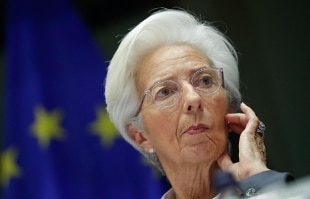- Lagarde: "Persistent uncertainties, but ECB will continue to support the economy"
- ECB: Eurozone continues to grow, but with risks, like Brexit
- Visco: more investment in Maneuver due to growth, no doubt about ECB measures effectiveness
- Draghi leaves ECB, Lagarde takes his place. The outgoing governor: we need more Europe
Share
by Tiziana Di Giovannandrea 02 December 2019First hearing at the European Parliament of the new president of the ECB, Christine Lagarde. According to the number one of the Eurotower, the economic growth of the euro area "remains weak" and this "is mainly due to global factors". Lagarde said that the prospects for the global economy remain uncertain and subdued. This weakens the demand for European goods and services.Lagarde then highlighted how support for the single currency is growing in the Eurozone and how the ECB intends to maintain a policy that is and remains expansive. "The ECB remains resolute in continuing its mandate" - he said - and the accommodative monetary policy position, a pillar of domestic demand during the recovery, "remains in place".
In particular, the economy in the Eurozone, remaining weak, with GDP growth of only 0.2% in the third quarter of 2019, and being the weakness mainly due to global factors, underlined how the outlook of the global economy remains weak and uncertain "slows down the demand for Eurozone products and services" affecting business confidence and investments. That said, explained Lagarde, "monetary policy can respond effectively even in the presence of external negative factors".
According to the number one of the ECB, " monetary policy has been a key driver of demand during the recovery and this will not change. Monetary policy will continue to support the economy and respond to future risks in line with the ECB's mandate on the stability of the prices and we will continue to monitor the side effects of our policy ". Lagarde reiterated "the commitment to respect the mandate, a vital commitment for the stability of the Eurozone economy and the well-being of the euro area citizens".
Lagarde: risks on central digital currency, other analyzes are needed
The hypothesis of a digital central currency requires "further analysis" on the part of the ECB, because if on one hand it could be used directly by citizens, on the other it would imply "risks", including that of altering the transmission mechanisms of monetary policy . The president of the ECB stated this at the European Parliament. A digital currency of central banks could also have repercussions "on the functioning of the global financial system and its stability. For this - concluded Lagarde - the issue of central digital currencies and their optimal configuration requires further analysis".
Furthermore, the review of the monetary policy of the Eurozone, which "will begin in the near future", "will require time for reflection and broad consultation" said Lagarde, stressing that "in particular the European Parliament, and this Commission in particular, traditionally they have been a unique place for dialogue ". Lagarde explained that "this time we will seek an even more intense and productive dialogue than in the past", emphasizing that, as number one of the ECB, it is his duty to report and engage in further discussion. The president of the ECB then pointed out that it is "premature to embark on debates on the precise dimension, direction and timing of the review, given that the issue has not yet been discussed in depth by the Governing Council". However, the president confirmed that "the strategic review will be guided by two principles, namely in-depth analysis and an open mind".
First signature on a euro banknote
"One of the most moving moments for me in the last few days was when I signed my first euro banknote," said Lagarde, explaining that he had heard "the imperative of being guardian of the euro".

